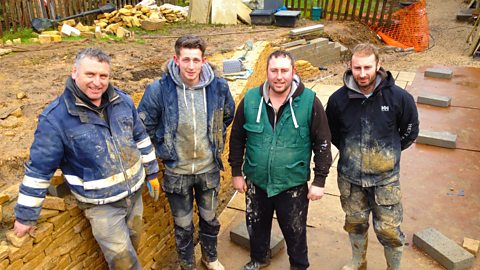Listening and taking notes
Watch the video to find out more.
Speaker 1: Hiya, Tone, you all right?
Speaker 2: Yeah, not bad, Ren. You?
Speaker 1: Yeah, good, thanks, good.
Just ringing you up, Toni. Up at Danny and Steve's place, we're on the next phase now and I'm looking for you to pop up to meet Steve and go through the layouts in the kitchen area and things.
Speaker 2: Yeah, OK. When do you need me?
Speaker 1: This week, ideally, Tone.
Speaker 2: OKI might struggle with that, to be honest.
Speaker 1: I'm sure you can fit it in!
Speaker 2: OK, how about Thursday morning?
Speaker 1: What sort of time on Thursday?
Speaker 2: About half past ten.
Speaker 1: Half past ten would be good, that'd be spot-on. Cheers for that, Toni.
Speaker 2: OK.
Speaker 1: Take care, bye-bye.
Speaker 2: Bye, then.
Speaker 3: Hi, you must be Toni.
Speaker 2: Hiya.
Speaker 3: Hi, I'm Steve. How are you?
Speaker 2: Nice to meet you.
Speaker 3: Nice to meet you, welcome.
So you can see where we've got to so far with the build.
The next stage is we're going to have our oak structure up and our roof can come up.
Speaker 2: OK.
Speaker 3: But now we need to start thinking about lighting and power sockets and so on.
OK, so we've got the plans here, so you can see what our layout is envisaged to be.
Speaker 2: OK.
Speaker 3: So we've got an island unit here in the centre.
Speaker 2: I see on the plan you've got a picture of a hob.
Is that going to be electric or?
Speaker 3: That will be electric induction hob, that's right.
Speaker 2: OK, that's fine.
Speaker 3: One thing we need to think about with that is the extractor unit.
Speaker 2: (TO AUDIENCE) Usually, there's a lot to discuss, you get a lot of information quite quickly.
You don't want to miss anything, so you're better off writing it down, getting as many notes as possible, so when you come back to it in the future, you've got everything that the client wants, everything that you need to check and you're not going to make any mistakes.
Speaker 2: (TO OTHER PEOPLE) Any sort of decorative lighting on those bits?
Speaker 3: Around the edges?
Speaker 2: Yep.
Speaker 3: Yeah. What we were thinking about, I don't know what you think, is maybe having some hidden or recessed LED lighting or something like that around the edge.
Speaker 2: Yep.
Speaker 3: So you see the effect of the light, but not the lights themselves, if that makes sense.
Speaker 2: Yes, the issue with your LED is that whatever you put in there, you may need to cover, or else you'll get a reflection.
Speaker 3: OK.
Speaker 2: You'll get little lights in the glass.
Some people like that, some people don't.
I can discuss that with Ren when I see him tomorrow.
Speaker 3: OK.
Speaker 2: All right?
Speaker 3: Great. Thanks very much indeed.
Speaker 2: No problem. Nice to meet you.
Speaker 3: See you on site, nice to meet you.
Cheers, Toni, bye-bye.
Turn notes into sentences
Test your knowledge with this activity.
Listening and speaking effectively
Watch the video to find out more.
Speaker 1: (TO AUDIENCE) Communication is a big part of this job.
So many factors change from the beginning to the end, you need to be able to discuss every little part of the job with the customer, with the builders.
Speaker 1: (TO OTHER PEOPLE) Right, I've had a word with Stephen, looked at the plans.
Nothing really that worries me, apart from we've got an island.
I need to get power to that, we've got an electric hob on there.
What are you doing with the floor?
Speaker 2: The floor is going to be 100mm insulation.
Speaker 1: Yep.
Speaker 2: Then it's going to be 75mm liquid screed, so, yeah, you can bring any wires up into the island under that.
Speaker 1: We'll put them in a duct and then leave them loose for you.
Speaker 2: Perfect.
Speaker 1: OK, lovely. When are you doing that?
Cos we'll have to get that in first.
Speaker 2: It's going to be a few weeks off yet, so what I'll do is give you a week's notice.
Speaker 1: The only other thing I've got to worry about is we're going to put some LED strip all along the top.
Speaker 2: Yeah. At the minute, just get the feeds in, we can get Steve and Danny to discuss that with us at a later date, when it comes to making it look right, OK?
Speaker 1: Yeah, that's absolutely fine. Everything else I'm happy with.
Speaker 2: Cool. Do you want to have a look at stuff in the garden?
Speaker 1: Yes, let's go.
Speaker 1: (TO AUDIENCE) To do a job and to do it well, and have the end result where I can turn everything on, it works, it looks good, the customer is happy, the builder's happy because it's all gone to schedule
That's the best part of the job, when it all comes together and you can all switch it on and say, 'I did that'.
What would you ask?
Test your knowledge with this activity.
More on Construction
Find out more by working through a topic
- count4 of 5
